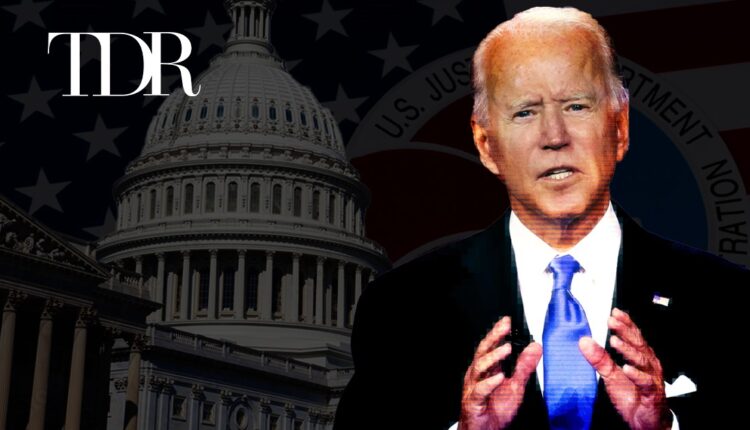
Marijuana Rescheduling Provides Justice and Economic Opportunity
The TDR Three Key Takeaways regarding Marijuana Rescheduling and Economic Opportunity:
- Biden’s marijuana rescheduling aims to address past policy failures.
- Rescheduling enables broader medical research on marijuana.
- Bipartisan support grows for comprehensive marijuana reform.
In a significant policy shift, the Justice Department is moving to reschedule marijuana from a Schedule I to a Schedule III drug, recognizing its medical benefits and addressing longstanding inequities in its federal treatment. President Joe Biden announced the move in a video on Thursday, emphasizing his administration’s commitment to addressing the “failed approach to marijuana.”
“This is monumental,” Biden declared. “Far too many lives have been upended because of a failed approach to marijuana, and I’m committed to righting those wrongs. You have my word on it.”
The rescheduling process, initiated by the Drug Enforcement Administration (DEA) and the Department of Health and Human Services (HHS) at Biden’s direction in 2022, has reached a critical stage with the DEA submitting a Notice of Proposed Rulemaking to the Federal Register. This initiates a 60-day public comment period before a final decision is made.
Reclassifying marijuana to Schedule III would mark a major change in federal drug policy, aligning marijuana with substances like ketamine and anabolic steroids, which are recognized for their medical uses and have a lower potential for abuse compared to Schedule I drugs such as heroin and methamphetamine.
This reclassification would enable federal scientists to conduct more comprehensive research on marijuana’s medical benefits, which could help treat conditions like anxiety, pain, and seizures. It could also allow pharmaceutical companies to develop and distribute cannabis-based medical products in states where marijuana is legal.
For the $34 billion cannabis industry, rescheduling would alleviate significant tax burdens by eliminating IRS Code Section 280E, which currently prevents legal cannabis companies from deducting ordinary business expenses. This change could also help reduce the black market by making legal markets more competitive.
Biden’s announcement builds on his administration’s previous actions to address the injustices of the War on Drugs. Last year, he issued pardons for federal offenses related to simple possession of marijuana and urged state governors to do the same. This rescheduling effort complements those pardons, aiming to reduce barriers to employment, housing, and education for those affected by past marijuana convictions.
The rescheduling announcement has received widespread attention and support, with Vice President Kamala Harris noting that the move acknowledges the disproportionality of marijuana’s classification compared to more dangerous drugs like fentanyl. Senate Majority Leader Chuck Schumer has reiterated the need for Congress to pass legislation to federally legalize cannabis, emphasizing that rescheduling alone does not resolve the federal-state cannabis policy gap.
The proposal has drawn mixed responses. Advocates for marijuana reform have welcomed the move, while some former DEA officials have expressed concerns about the potential risks associated with the drug’s side effects. The public comment period is expected to generate extensive feedback, reflecting the broad and competing perspectives on marijuana policy.
Former DEA Administrator Asa Hutchinson noted that it “absolutely looks like” the DEA will follow through with rescheduling, acknowledging the changing landscape of cannabis regulation and public opinion.
Companies have been very excited about the changes. For example, Canopy Growth which is entering the US via Canopy USA stated this: “Canopy Growth commends President Biden for taking clear action to advance rescheduling in the United States and fully supports the DEA’s recommendation to move cannabis to Schedule III. This change represents a major leap forward and an opportunity to correct a long-standing wrong which has disproportionally impacted marginalized communities, inhibited research, and restrained the responsible growth of the U.S. cannabis industry. In addition to setting an important precedent and paving the way for additional reform including full legalization, rescheduling is especially significant as it provides an immediate and significant improvement to the cashflow of all state-legal cannabis businesses including those within Canopy USA.”
The Biden administration’s move to reschedule marijuana represents a historic shift in federal drug policy, addressing both the medical potential of marijuana and the social injustices stemming from its previous classification. As the rescheduling process unfolds, it is poised to open new avenues for research, medical use, and economic opportunity while highlighting the ongoing need for comprehensive legislative action to fully realize the benefits of this reform.
Want to keep up to date with all of TDR’s research and news, subscribe to our daily Baked In newsletter.



